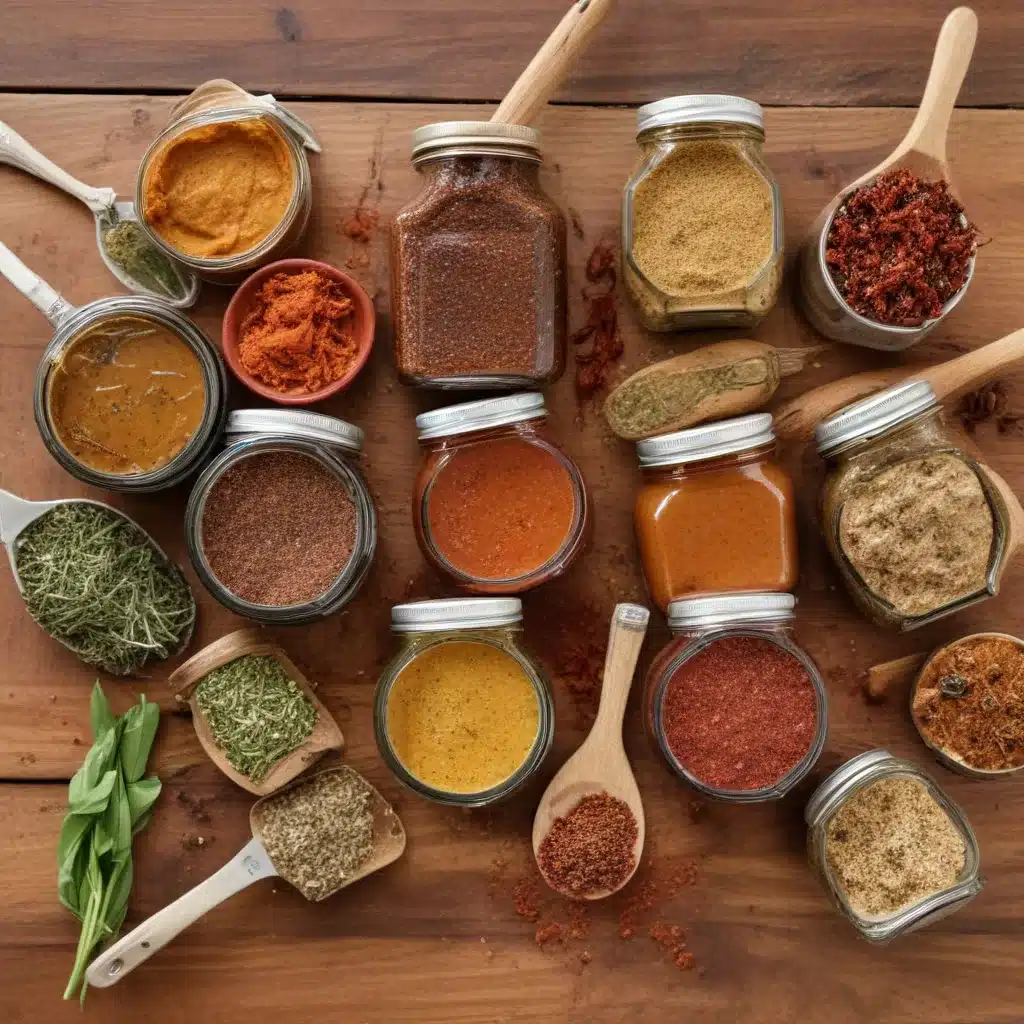
Elevating Backyard Barbecue with Customized Dry Rubs
As an experienced barbecue pitmaster, I’ve spent countless hours perfecting the art of seasoning and marinating meats to bring out their absolute best. Whether I’m preparing ribs for a competition or firing up the grill for a backyard gathering, the key to mouthwatering barbecue lies in the careful selection and application of homemade rubs and marinades.
One of the first things I learned on my barbecue journey was the transformative power of a well-crafted dry rub. Over the years, I’ve experimented with countless blends, tweaking the ratios of sweet, savory, and spicy components to find the perfect balance. From a classic Kansas City-style rub with brown sugar and cayenne to a unique coffee-infused seasoning, these DIY dry rubs have become the foundation of my signature barbecue flavors.
Crafting the Perfect Dry Rub: Balancing Sweet, Heat, and Savory
When it comes to building a flavorful dry rub, the key is to strike the right balance between sweet, heat, and savory elements. One of my go-to all-purpose rubs starts with a generous helping of brown sugar, which caramelizes beautifully on the meat’s surface, creating a delectable crust. But I don’t stop there – I also add a blend of warming spices like paprika, garlic powder, and onion powder to build a robust, earthy backbone.
The real magic, however, comes from the interplay between the sweet and the heat. A touch of cayenne pepper or chili powder provides a subtle kick that complements the brown sugar perfectly, creating a mouthwatering flavor profile that keeps people coming back for more. I’ve found that this combination works wonderfully on a wide range of proteins, from juicy pork shoulders to tender brisket.
Unlocking the Secrets of Homemade Marinades
While dry rubs are the foundation of my barbecue repertoire, I also believe in the power of a well-crafted marinade to take your smoking and grilling to new heights. Marinades allow you to infuse your meats with a symphony of flavors, while also helping to tenderize tougher cuts.
One of my favorite marinades is a sweet and savory blend that combines soy sauce, honey, and a splash of apple cider vinegar. The soy sauce lends a rich, umami depth, while the honey provides a subtle sweetness that caramelizes beautifully on the grill. The vinegar helps to break down the meat’s connective tissues, resulting in a tender, juicy final product.
But the magic doesn’t stop there – I also like to incorporate aromatic ingredients like minced garlic, fresh ginger, and fragrant herbs to really amp up the flavor. The combination of these bold, complementary elements creates a marinade that truly transforms ordinary proteins into extraordinary barbecue masterpieces.
Experimenting with Unique Flavor Profiles
While tried-and-true rubs and marinades are the foundation of my barbecue arsenal, I’m always on the lookout for new and innovative ways to elevate my craft. One of my recent experiments involved incorporating freshly brewed coffee into a dry rub blend.
The idea stemmed from my love of coffee’s rich, earthy notes, and I was curious to see how they would pair with the smoky, sweet, and spicy elements of a traditional barbecue seasoning. After some careful experimentation, I landed on a winning formula that combines ground coffee, brown sugar, smoked paprika, and a touch of cayenne.
The result is a dry rub that adds a unique depth of flavor to grilled vegetables, tofu, and even portobello mushrooms. The coffee’s bitterness perfectly balances the sweetness of the brown sugar, while the spices lend a subtle heat that lingers on the palate. It’s a flavor profile that truly elevates plant-based dishes, proving that barbecue rubs aren’t just for meat-based proteins.
Mastering the Art of Bark and Crust
Of course, no discussion of barbecue rubs and marinades would be complete without a nod to the all-important “bark” – that flavorful, crunchy crust that forms on the surface of expertly smoked meats. Achieving the perfect bark is a true mark of a skilled pitmaster, and it’s a process that requires careful attention to technique.
One of the key factors in creating a show-stopping bark is the type of sugar used in the dry rub. While brown sugar is a popular choice for its caramelizing properties, I’ve found that Demerara sugar can be an even more reliable option. With its larger crystals and higher burning point, Demerara sugar is less prone to burning or forming a hard, brittle crust, allowing for a more manageable and consistent bark.
But the type of sugar is just one piece of the puzzle. The amount of rub used, the cooking temperature, and the overall time spent in the smoker or on the grill all play a crucial role in the final outcome. It’s a delicate balance that requires a keen eye and a willingness to experiment.
Barbecue as a Culinary Art Form
At the end of the day, the world of barbecue is a never-ending journey of discovery and refinement. As a pitmaster, I’m constantly pushing the boundaries of what’s possible, exploring new flavor combinations and techniques to keep my craft fresh and exciting.
Whether I’m whipping up a signature dry rub or crafting a mouthwatering marinade, my goal is always to unlock the true essence of the ingredients and showcase them in the most delicious way possible. It’s a culinary art form that requires patience, attention to detail, and a deep reverence for the craft.
So, if you’re a barbecue enthusiast looking to elevate your game, I encourage you to dive headfirst into the world of homemade seasonings and marinades. Experiment with different blends, play with unique flavor profiles, and don’t be afraid to get your hands dirty. After all, the true joy of barbecue lies in the journey of discovery – and trust me, the rewards are well worth it.

